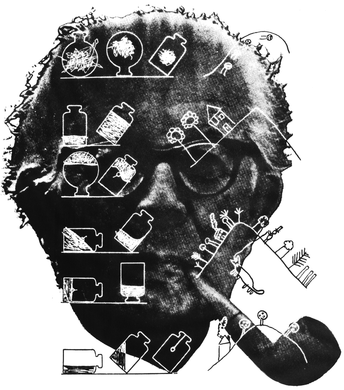Jean Piaget1896–1980
Piaget isolated specific stages of cognitive development through which children pass and which could be assessed by particular tasks. That is, he argued that intelligence progresses in discrete steps, which he called the sensori-motor and preoperational stages, followed by the stages of concrete and formal operations. This was contrary to Binet’s view that intelligence increased steadily with age. The sensori-motor stage applies from birth to about two years of age and is mainly concerned with relating motor responses to patterns of stimulation. Cognitive concepts emerge in the preoperational stage (from two to around seven years), but there remain tasks, like conservation, that are not solved until the concrete operational stage (from about seven to eleven years). “Until about 11, to think is to speak - either with the mouth or with the little voice situated in the head - and speaking consists in acting on things themselves by means of words, the words sharing the nature of the things named as well as of the voice producing them.” Abstract reasoning develops in the formal operational stage, beyond eleven years of age. Throughout the stages of cognitive development processes of assimilation and accommodation interact. Recognizable features of the world are assimilated into the cognitive framework, whereas novel ones require learning to accommodate them. Piaget was born in Neuchâtel. He developed an early interest in natural history and received his doctorate in that subject from his home university. His introduction to child psychology was under the guidance of Simon in Paris, where he investigated reasoning tests in children. Piaget did not simply note whether children performed the test items correctly or not, he asked them why they gave the answers they did. One outcome was the appreciation that tasks involving parts and wholes were particularly difficult for children under twelve. “First of all it became clear to me that the theory of the relations between the whole and the part can be studied experimentally through the analysis of the psychological processes underlying logical operations.” He then decided that the progress of the developing intellect could best be charted by means of careful observation and inference, as had proved successful in following embryological development, and he termed this approach genetic epistemology. This programme of research was actively pursued at the Rousseau Institute in Geneva when he became its director in 1921 and where he remained until his death. Piaget’s writing almost matched Wundt’s in volume. As was the case with Bartlett, his cognitive approach did not initially resonate with the dominant behaviourism in America, but his influence has been widespread in the second half of the century. Piaget is represented, with his much loved pipe, in the context of children’s drawings of fluid in a container and of objects on a hill, made between about four and eight years of age.
